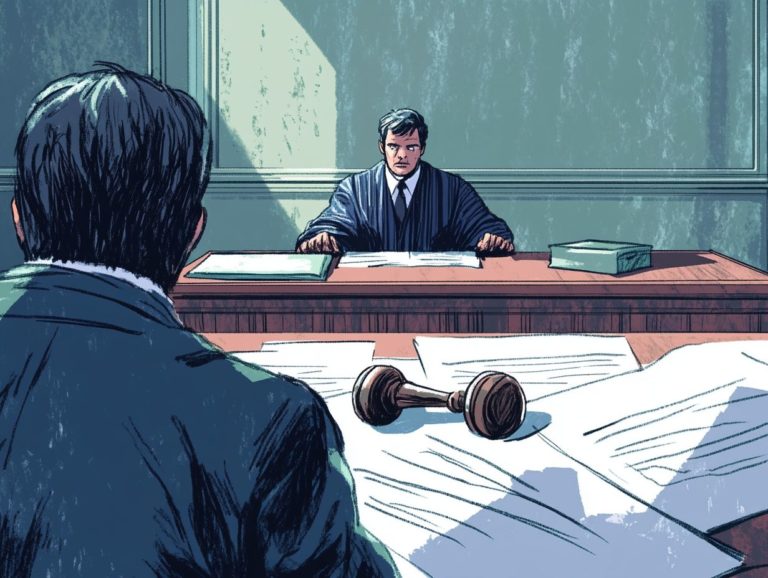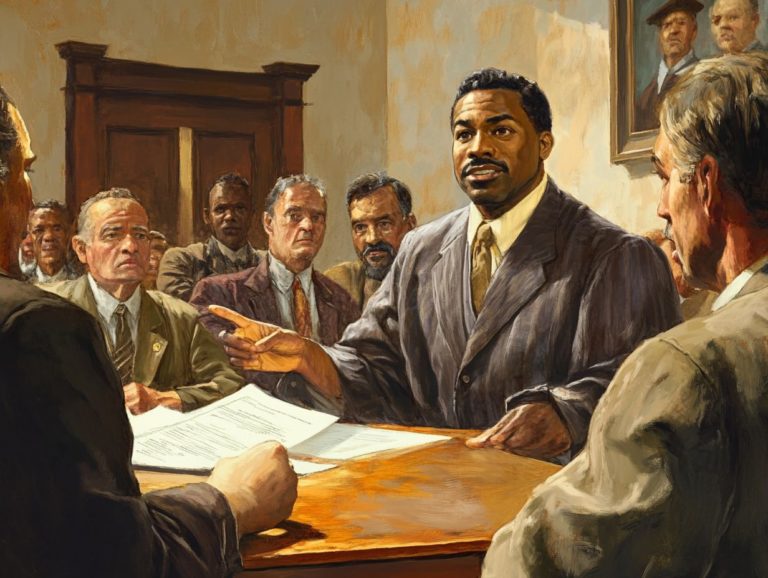How to Prepare for Your First Meeting with a Lawyer?
Preparing for your first meeting with a lawyer can feel overwhelming, especially when you’re uncertain about what lies ahead. This guide will navigate you through the entire process. It will clarify the meeting’s purpose, highlight the significance of having legal representation, help you gather essential documents, and establish your objectives.
You ll find insights on crucial questions to pose and a checklist of what to bring. This will ensure you walk in feeling confident and well-informed. It also outlines the next steps after your meeting, so you re fully equipped to progress.
Get ready to take charge of your legal journey!
Contents
- Key Takeaways:
- Understanding the Purpose of the Meeting
- Preparing for the Meeting
- Questions to Ask During the Meeting
- What to Bring to the Meeting
- After the Meeting
- Frequently Asked Questions
- What should I bring to my first meeting with a lawyer?
- How can I research the lawyer before the meeting?
- Should I prepare a list of questions for the lawyer?
- What should I expect during my first meeting with a lawyer?
- How can I make the most out of my first meeting with a lawyer?
- What should I do after the meeting with the lawyer?
Key Takeaways:
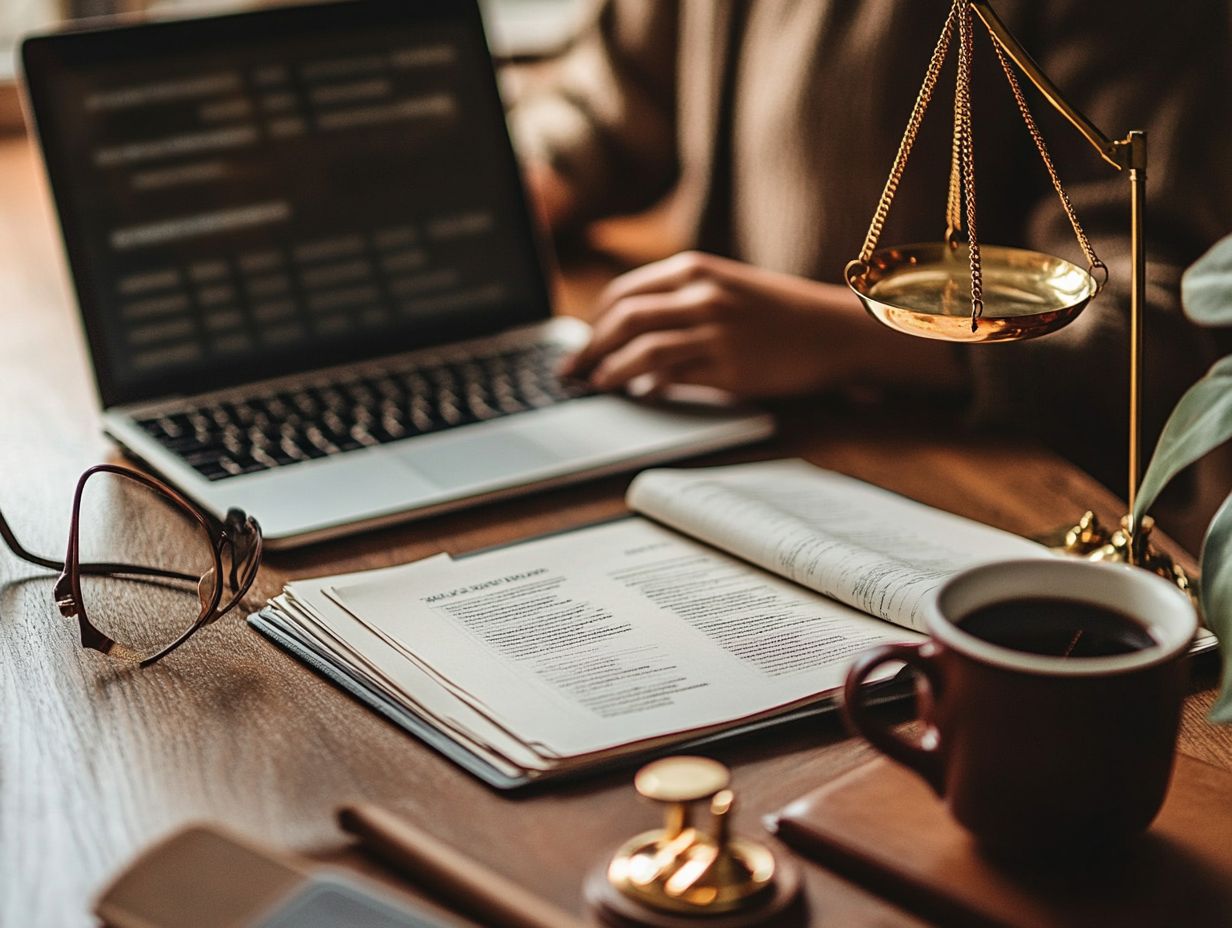
Understand the purpose of meeting with a lawyer and why you need one for your case. Come prepared by gathering necessary documents, setting goals and expectations, and asking relevant questions during the meeting. Bring important documents, take notes during the meeting, and reflect on the experience to make informed decisions afterwards.
Understanding the Purpose of the Meeting
The initial consultation with a lawyer is important for grasping the intricate details of your legal matter, especially in sensitive areas such as divorce and child custody. This meeting is not just a formality; it s your chance to forge a robust attorney-client relationship.
Here, you can share crucial information about your case, set realistic expectations, and explore different strategies within the confidential relationship that allows you to speak freely with your lawyer. At this stage, gaining a deeper understanding of the legal system is essential.
Focusing on your emotional well-being and rights is also vital. This foundation ensures effective communication and fosters the trust necessary for navigating your legal journey.
Why You Need a Lawyer
Hiring a lawyer is crucial when working through the challenges of family law, especially during significant life events like divorce or child custody disputes.
The intricacies of legal proceedings demand expertise that only a seasoned attorney can provide. With their extensive knowledge of family law, they offer invaluable insights that enable you to make informed decisions on critical matters.
A lawyer delivers sound legal advice tailored to your unique circumstances, ensuring you fully understand your rights and obligations throughout the process. This clarity regarding your legal standing gives you the power and helps you sidestep common pitfalls that could arise without proper guidance.
Ultimately, this approach paves the way for a smoother and more favorable outcome. This meeting could change everything for you!
Preparing for the Meeting
Preparing for your meeting with a lawyer requires gathering essential documents and information that will foster a productive discussion about your case. This preparation also ensures that both you and your attorney are aligned on the nuances of your situation, setting the stage for effective collaboration.
Gathering Necessary Documents and Information
Gathering the necessary documents and evidence is a crucial step in preparing for your meeting with a lawyer. This process clarifies the details of your case and lays a solid foundation for effective legal advice.
Along with your personal identification and specifics about the incident, compile financial records, communication logs, and any relevant court documents.
- Financial records, such as income statements or bills, help outline the economic impact of your situation.
- Communication logs can illustrate exchanges that may bolster or undermine your claims.
- Relevant court documents provide necessary context and procedural history.
Each of these elements works in harmony to build a compelling case while ensuring you feel emotionally supported as you navigate the complexities of legal proceedings.
Setting Goals and Expectations
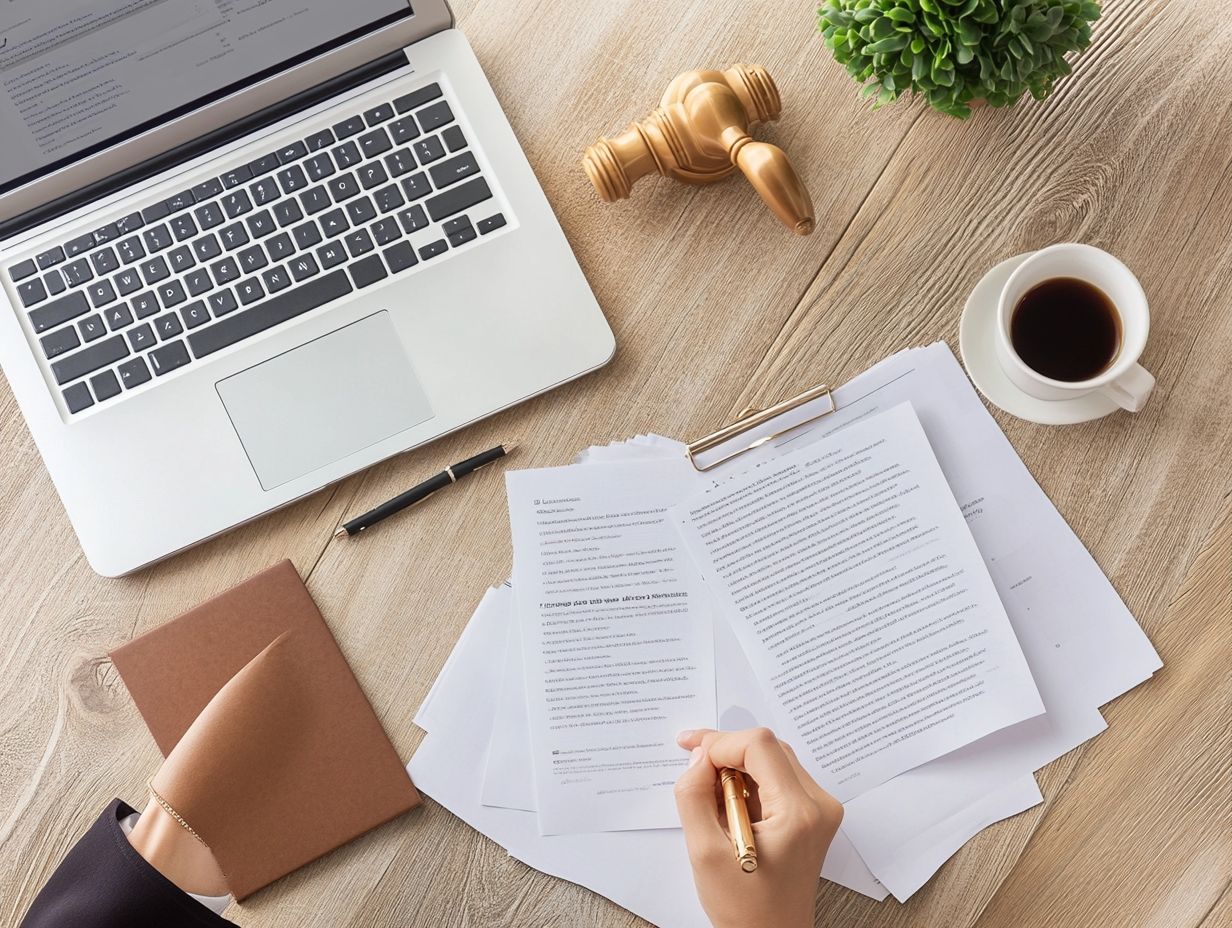
Before meeting your lawyer, set clear goals. This step can change the entire course of your legal journey and enhance your emotional well-being.
By explicitly defining what you aim to accomplish whether gaining insights into complex divorce proceedings or establishing a co-parenting plan that prioritizes your children’s best interests you empower yourself.
This clarity equips your legal representative with essential information needed to develop an effective strategy. If custody arrangements are your primary concern, explaining these goals at the outset will guide your lawyer’s approach to negotiations or court advocacy.
This level of clarity ensures that all subsequent legal actions align with your overarching goals. It paves the way for a smoother and more focused resolution to your family law matters.
Questions to Ask During the Meeting
During your initial consultation with a lawyer, asking the right questions is essential. This approach helps you gauge their experience and expertise in family law.
Don t forget to inquire about attorney fees and the specific services they offer.
Clarifying the Lawyer’s Experience and Fees
Clarifying your lawyer’s experience and fees is vital for establishing trust and transparency in your lawyer-client relationship. A clear understanding of their qualifications boosts your confidence in their ability to handle your case effectively.
An open discussion about their history of handling similar cases is crucial. Additionally, exploring any specialties that align with your needs is important. Discuss the fee structure, whether billed hourly or through a flat-rate arrangement.
This knowledge helps eliminate potential surprises and sets realistic expectations for your financial commitment. By thoroughly addressing these aspects, you can cultivate a stronger partnership built on informed decision-making and mutual understanding.
Discussing Your Case and Possible Strategies
Discussing your case and potential strategies with your lawyer is a crucial aspect of the initial consultation. This collaboration allows you to create a plan designed to meet your unique needs.
By sharing all relevant details such as a timeline of events and emotional considerations you ensure that your legal counsel fully understands the situation. This transparency enables your attorney to offer thoughtful legal advice that can significantly shape your case.
What to Bring to the Meeting
Bringing appropriate documents and information to your meeting is crucial for a comprehensive discussion about your case. This is especially important in family law matters, like divorce and child custody, where every detail can significantly influence the outcome.
Important Documents and Notes
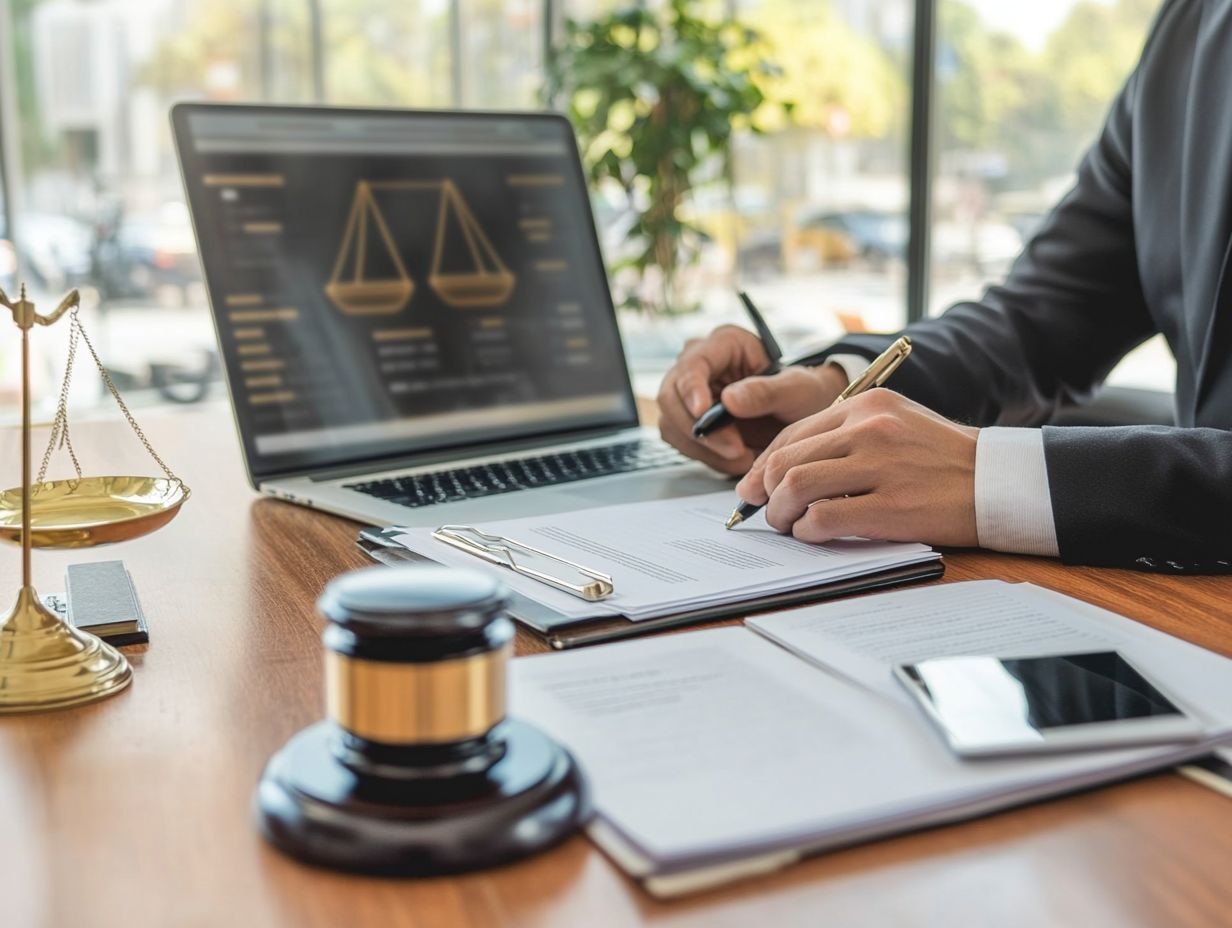
Bringing important documents and notes related to your case is essential. These materials provide the concrete evidence and context necessary for understanding your legal situation.
- Financial records such as bank statements, tax returns, and invoices highlight the economic implications tied to your case.
- Keep a record of all communications including emails, letters, and notes from phone calls these documents often capture crucial exchanges and agreements.
- If relevant, gather contracts, legal notices, or court documents to bolster your position.
This level of thorough preparation allows your lawyer to grasp the intricacies of your case, ensuring that the legal advice you receive is informed and tailored specifically to your unique circumstances.
After the Meeting
Following your meeting with a lawyer, take a moment to reflect on the conversation. Consider the key points discussed and clarify the next steps and follow-up actions needed to advance your case.
Next Steps and Follow-Up Actions
Identifying your next steps after meeting with your lawyer is crucial. This ensures your case progresses smoothly.
This phase may involve gathering additional documents essential for building a strong case. It’s also important to schedule future meetings. Open lines of communication will help clarify any uncertainties.
Following the plan you and your lawyer discussed is vital to ensure you’re aligned in your approach.
Emotional support is invaluable. Legal matters often come with stress. Seeking reassurance from friends, family, or support groups can help ease your anxiety. This allows you to focus on the tasks ahead with greater clarity.
Reflecting on the Meeting and Making Decisions
Reflecting on your meeting with a lawyer is essential for making informed decisions about your case, especially in family law matters.
As you evaluate the facts and options presented during your discussion, don’t overlook the emotional weight these decisions carry. Each choice can significantly impact personal relationships and overall well-being.
Take the time to assess how the information resonates with you emotionally. This will help you navigate the complex feelings that often arise in legal scenarios.
Effectively following your lawyer’s recommendations requires not just understanding legal frameworks but also being aware of your emotional responses. Balancing legal realities and emotional stability can lead to more peaceful resolutions.
Frequently Asked Questions
What should I bring to my first meeting with a lawyer?

Bring any relevant documents related to your case, including contracts, emails, bills, and legal notices. Writing down a list of questions or concerns for the lawyer is also helpful.
How can I research the lawyer before the meeting?
You can research the lawyer’s experience, areas of expertise, and client reviews online. You can also ask for recommendations from friends or family members who have used a lawyer in the past.
Should I prepare a list of questions for the lawyer?
Yes, preparing a list of questions ahead of time is beneficial. This will help ensure you cover all your concerns and get the most out of your meeting.
What should I expect during my first meeting with a lawyer?
During the meeting, the lawyer will ask you questions about your case and listen to your concerns. They may also provide information about the legal process, potential outcomes, and their fees.
How can I make the most out of my first meeting with a lawyer?
Be honest and open with the lawyer about your case and any relevant information. Ask any questions you have, and take notes to reference later. Discuss potential strategies and outcomes for your case.
What should I do after the meeting with the lawyer?
Right after the meeting, reach out to your lawyer! Confirm the next steps and any documents they need from you. Take time to reflect on the information discussed and decide if you want to move forward with the lawyer.

